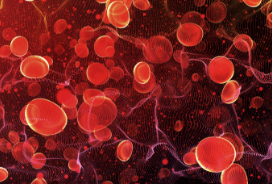The alpha1-glycoprotein acid was one of the first glycoproteins to be isolated in human plasma. It contains a large number of carbohydrate moieties, giving it a very negative charge and high solubility in water. Many biological functions have been proposed for the alpha-1-glycoprotein acid, but its true physiological role still remains uncertain today. The alpha1-glycoprotein acid is able to bind to many basic and lipophilic components, such as hormones (progesterone, etc.), medications, drugs, etc.
It is also an early inflammatory phase protein and its concentration increases three to four times in case of acute or chronic inflammation or tissue necrosis. Its concentration also increases because of glucocorticoid hormones, whether endogenous (Cushing’s syndrome, etc.) or exogenous (treatment with prednisone or dexamethasone, etc.)
A low concentration of alpha1-glycoprotein acid due to increased urinary excretion is associated with the nephrotic syndrome. Taking oral contraceptives can also reduce its serum concentration.

